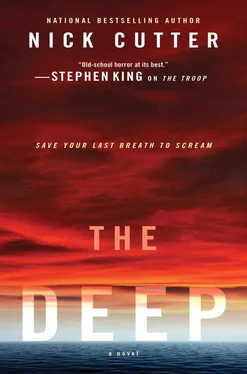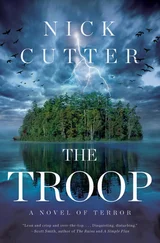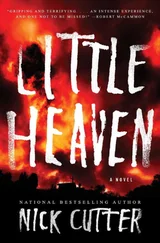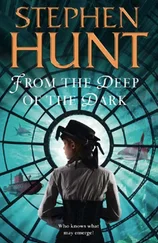
THE OLD MAN’S HEADwas covered in mantises.
At first Luke thought it was a wig or some weird toupee—but he was at the southern tip of Guam, a few miles from the Pacific, and the man was wearing tattered clothes and what looked like strips of old radial tires lashed to his feet. Why bother with a toupee?
The driver saw the old man, too. He hissed between his teeth—an uneasy tssshk! He said something under his breath: a curse, maybe a prayer? Luke didn’t speak the local dialect.
“I’ll do it,” Luke told the driver. “You wait here.”
He elbowed the Jeep’s door open. Sweet Jesus, the heat. It’d hit him like a fist when he stepped onto the runway at the Agana airport. It hit him again now—the tropical air, laden with the nectar of heliotropes, caused beads of sweat to pop along his brow.
The old man stood facing the wall of a one-story workshop. The ground was strewn with hubcaps and crankcases snarled in rusted wiring. Wrist-thick vines snaked out of the greenery to twine around the industrial junk; with nobody around to hack it back, the jungle would reclaim this spot in a matter of months.
The old man was walking into the wall—his sandals made a gentle whush-whush as they brushed the yellowing adobe. The spotting was pronounced on his bare arms and his throat. The scabs were dime-sized, bigger than what Luke was used to seeing. Some of them had cracked open and were leaking grayish pus.
Luke had no clue what had drawn the mantises. Maybe they’d dropped from the creeping ivy snarled across the shop’s roof. Or maybe something on the man’s scalp, or leaching out of it, had attracted them.
They were the largest insects Luke had ever seen. Each mantis was the length of his thumb, and muscular-looking. They had swollen, cantilevered abdomens that curved above their sharp, considering faces. A baker’s dozen or so carpeted the man’s skull.
Luke got the sense of them turning to stare at him, all at once.
Luke retreated to the ditch. His feet sank into the muck. He didn’t like the way it sucked at his boots—greedy, a lipless brown mouth.
He found a stick and went back. The insects squirmed quarrelsomely on the man’s head, which was covered with wispy white hairs as downy as those on a baby’s skull. Their exoskeletons made a brittle chitter. What the hell were they doing?
Luke watched their choreographed manner. The stink of burned diesel mixed with the heliotropes to create a sticky vapor that coated his throat. Distantly, he heard the driver repeat what he’d said before—that breathless curse or prayer—and Luke was worried he’d set the Jeep in gear and take off, leaving him with the old man and the mantises, the heat and the crawling jungle.
What in God’s name were those bugs doing ?
One mantis pinned another in a violent vise grip, then widened its jaws and bit down, cleaving the other’s head in half. Their abdomens were wed. What was clearly the female continued to eat the male’s head while his antenna whipped about frantically.
Using the stick, Luke brushed the mantises off the man’s skull. A decapitated male skittered wildly across Luke’s fingers; he shook it into the mud with the rest of them. The urge arose to step on them. Squash them all to paste.
Instead, Luke set his hands on the old man’s shoulders to turn him around. His expression was familiar: The Big Blank . His eyes gone milky, the edges of his eyelids pebbled with nodules of acne that gave his skin the look of an orange rind. His mouth wide open, his tongue coated in white film. He may not have drunk water in days. He’d forgotten to, probably.
That’s how it went with the ’Gets: you forgot the little things first, then the not-so-little things, then the big ones. Next, the critical ones. In time, your heart forgot how to beat, your lungs how to breathe. You die knowing nothing at all.
As soon as Luke pointed him in a new direction, the old man started to walk. He’d go on until he fell down or stepped off a cliff or stumbled into a leopard’s den, if they had those around here. And Luke couldn’t do a damn thing about that.
He climbed back into the Jeep. The driver eased past the old man as he tottered down the road, that clingy mud sucking up past his ankles already. Luke watched as they pulled away, the old man’s body becoming indistinct through the stinging fumes.
A VISTA OF HEAT-STOOPED PALMSgave way to the town of Inarajan. The buildings were pueblo-rustic and had a worn but functional look, with whitewashed tin roofs.
A fan of red grit rose in the Jeep’s wake; it appeared to hover in the intense heat, refusing to settle. The Jeep’s vents blasted humid air. The creased skin at the back of Luke’s neck was grimy with sweat and dirt.
The Pacific rolled out to the south. The water deepened to an icy blue. Two old women sat on a buckled porch smoking cheroot cigars. None of the villagers looked worried. None of the shops had been looted. That had occurred in other places, but for the most part, humanity had simply carried on. If this was the apocalypse, it was to be an orderly and complacent one.
The village children watched the Jeep rumble past. One of them, a girl of about eight, smiled at Luke. A cluster of dark specks dappled her elbows, like the bruises on a banana as it turns overripe.
The Spots. They would get bigger, cover her body, turn crusty then pustulant… then she’d begin to forget. Minor stuff at first. Where she’d left her dolly or how to tell the time of day. Then she wouldn’t know how to tie her shoelaces; she might spend hours bent over her feet, trying to lace however she’d been taught—the bunny ears method? Loop, swoop, and pull? She’d laugh at first— I’m being such a silly-billy! —but she would soon become frustrated, as children do, and start to cry.
Next, she’d forget her brother’s name and the smell of her father’s pipe tobacco, and soon enough, her own face in the mirror. She’d forget what hot or cold should feel like, and then even the concepts of heat and cold. That would have to be the worst part, Luke figured: forgetting those elemental assurances everyone is born with. She’d look at the nut tree in her yard and forget the sensation of its leaves brushing her skin; soon she’d forget what leaves were to begin with, and how vital they are to that tree, the same way our veins are vital to our bodies (she’ll have forgotten about veins by that point, too). She’d forget how wonderful those nuts taste—after that, she’d forget why eating mattered much at all.
The tree would make no sense to her. Nothing would, actually.
THE YACHT WAS MOOREDfive hundred yards off the Inarajan wharf.
Its original owner was a Vegas casino magnate. Its home dock was in Okinawa, Japan, but Uncle Sam had recently conscripted it in the service of science. Its owner didn’t argue its seizure, Luke had been told, due to the fact that he’d forgotten he’d ever bought a yacht. The ’Gets had a way of loosening prior rights of ownership.
Luke grabbed his duffel and nodded good-bye to the driver. The sun-bleached planks squealed under his boots. Fiddleback crabs skittered around the pilings, raising puffs of sand. An eel—a black, sinuous ribbon—darted out, plucking up a crab before vanishing beneath the wharf.
Читать дальше














